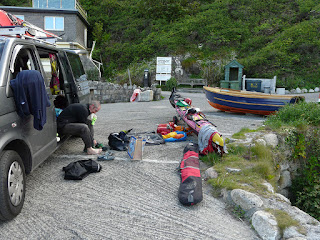You’ve heard of ‘Glamping’? Well this trip was one better, the
‘Glexped’. Rather than dragging a loaded boat everywhere and slumming it in a
soggy, flapping tent each evening, I was going to have a support ‘crew’ (actually
my long suffering girlfriend, Pascale) along with a van for the 2015 trip.
So why go ‘supported’ this time? Well there were a number of
reasons:
- I was getting old.
- I was getting soft.
- I wanted to understand the advantages and disadvantages of supported versus unsupported expeds.
- The main reason however was the state of my back. I’d suffered back problems for as long as I could remember. Man-handling a loaded boat each day during the 2012 trip had caused me serious trouble. After the trip was over it took 2 years before I could start to paddle hard again, it was 3 years before my back returned to the state it was before I set out. On the way I struggled with work, driving and seriously thought my paddling career would end. My 48th birthday would (hopefully) pass during this trip, and I wasn't prepared to risk another 3 years out.
 |
| Fully dry when crusty |
With Hind-Sight (dated 23rd August 15)
Going
supported achieved the main aim; I completed the trip with no significant back
problems. In fact I feel in a pretty good state as I write, perhaps they should
put the UK Circ on prescription.
Support
Advantages:
- Some daily admin was reduced for me; I didn't have to drag my loaded boat in a time-consuming, clumsy manner around seaside towns in order to buy food for example.
- A wider range of kit could be carried in the van which gave me more options and a better stock of dry clothing!
- Quality of sleep was much better - important.
- I had someone to discuss ideas, plans and strategies with or just to talk about the day – all significant too.
However
the advantage wasn't as clear cut as it may first seem. Much of the coastline
was remote and road access limited. This meant that I still carried a reasonably
heavy daily paddle load. Yes, I didn't need days of food or water, or a week
worth of maps - but I still had to carry spare clothing, repair kit, shelter,
first aid, trolley and so on. On the
remotest stretches when we were pushing the weather limits I carried overnight
camping equipment too.
Support
Disadvantages:
- Daily route planning was a little more complicated, at times daily distances were dictated by available road accessible get-outs.
- The fact that more kit could be brought along was a double edged sword - bigger faffs could result.
- The van itself added some complications too – finding camp-sites, time on ‘van admin’ etc.
- You had to consider the needs of the support crew too – you couldn't always be entirely self-centred or focussed – compromises had to be made at times.
- You could get too comfortable; there were a few late starts when a warm, dry(ish) van was more appealing than cold, crappy seas.
- Didn't get the full ‘exped experience’, or perhaps more correctly got a different exped outlook.
On
the whole the van worked well, it did make life more comfortable, life off the
water was improved. But it didn't guarantee a greater daily mileage.
At
the end of the day the weather was still the most significant factor - we still went
11 days slower than in 2012.



